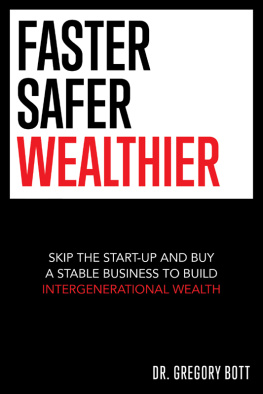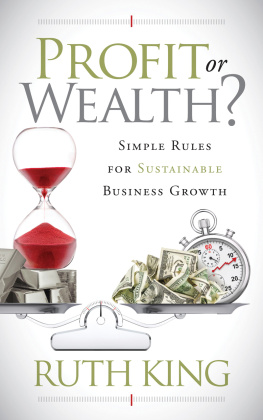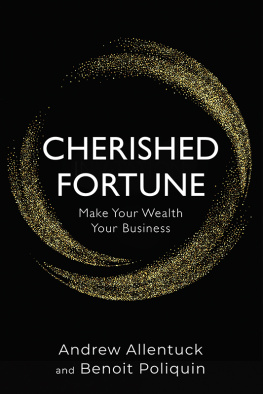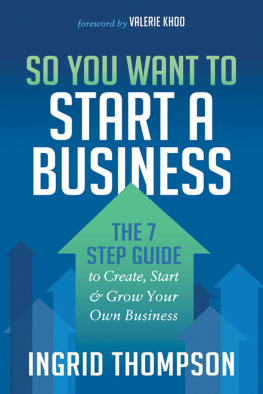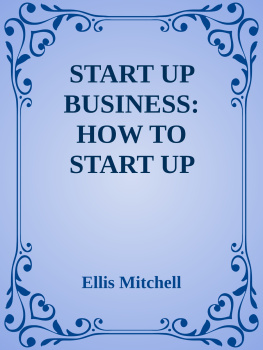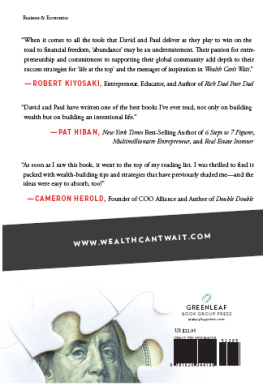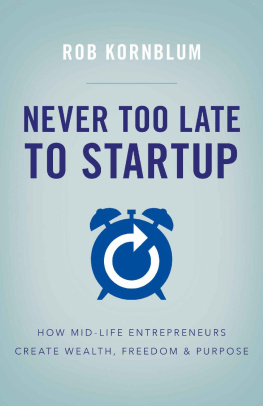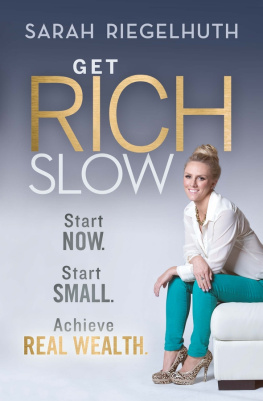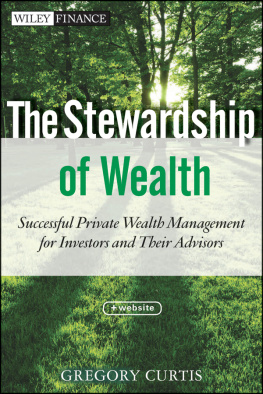Faster Safer Wealthier: Skip the Start-up and Buy a Stable Business to Build Intergenerational Wealth
Greg Bott
Published by ABJA Inc, 2021.
While every precaution has been taken in the preparation of this book, the publisher assumes no responsibility for errors or omissions, or for damages resulting from the use of the information contained herein.
FASTER SAFER WEALTHIER: SKIP THE START-UP AND BUY A STABLE BUSINESS TO BUILD INTERGENERATIONAL WEALTH
First edition. December 14, 2021.
Copyright 2021 Greg Bott.
ISBN: 978-1777813215
Written by Greg Bott.
10 9 8 7 6 5 4 3 2 1
Copyright 2021 Greg Bott
All rights reserved. No part of this publication may be reproduced, distributed, or transmitted in any form or by any means, including photocopying, recording, or other electronic or mechanical methods, without the prior written permission of the publisher, except in the case of brief quotations embodied in critical reviews and certain other noncommercial uses permitted by copyright law. For permission requests, write to the publisher, addressed Attention: Permissions Coordinator, at the address below.

www.gregbott.com
ISBN: 978-1-7778132-0-8 (print)
ISBN: 978-1-7778132-1-5 (ebook)
Ordering Information:
Special discounts are available on quantity purchases by corporations, associations, and others. For details, contact us at www.gregbott.com.
On a Thursday in August, our team braced for the worstwe had just tripled the size of our company overnight. Would we be able to keep up with the phone calls and emails in the days, weeks, and months to follow? Had we taken on more than we could handle?
We had just purchased the business of a competitor. Leading up to the closing date, the team could feel my anxiety as I nervously managed by pacing around the office, continually asking for reassurance that every department was ready to take on the added workload. However, as we anxiously coached our teams through the process and provided for repetitive training on our systems, the phones never rang. It was the calm before the storm, but the storm never came.
What were we overlooking? Was it really that easy? At the stroke of midnight, we had just achieved a revenue growth that was twice that of which we had been able to accomplish in our start-up grind during the past two and a half years.
Prior to this, my experience had been with start-ups, not the acquisition of an existing business. What I had failed to recognize is that we had purchased a complete business: the customers, the talented staff, and the refined systems. Every detail of the business continued as a well-oiled machine.
After an anticlimactic week of business as usual, I looked up at my business partner through the glass that separates our offices, closed my laptop, and yelled out, You seem to have this under control. Im going farming. See you in November.
They didnt need me. I would just be in the way of people far more talented than myself. I could continue to collect my paycheque, while once again taking control of my most valuable resourcemy time: time to be where I want, when I want, and not to be reliant on performing a certain work function at a certain time in exchange for a paystub. Time to read, write, research, teach, travelor farm.
What areas of your life do you wish to have more time for? Try to imagine your life one year from nowyou are the owner of a well-established business, which is producing your goal income, and you are on pace to hit personal financial freedom that ultimately results in the lifestyle you have always dreamt of. Is that possible?
There has never been a better time to be an entrepreneur; to own a business and to grow that business, with the outcome of building and retaining substantial wealth at a level unachievable in a nine-to-five career. And it has never been easier to build sustainable intergenerational wealth within a single generation.
A recent study found that nearly nine out of 10 millionaires in America have made their own wealth: they started with nothing, and in many cases came from extreme poverty (Cumberland 2019, 20). An individuals economic starting point has therefore become less relevant to where they end up on the financial spectrum.
During previous economic periods, wealth tended to be inherited between generations, and it continued to accumulate through investments, either in private or public corporations or in real estate. It was the landowners and, later, the factory owners who held the abundance of wealth. As a result, the fortunes of the superrich tended to come from inherited wealththe passing of capital between generations.
However, in the current economic climate, new money prevails. Salaries and active business incomes account for the majority of the income of the superrich (e.g. the top one percent of income earners), who are now termed the working rich (Freeland 2012).
We are in an economic period of fresh opportunity: a period in which becoming financially whole is achievable for almost anyone and where opportunities are waiting to be captured by those enthusiastic about engaging with the entrepreneurial grind.
The exit of the baby boomers is opening up gaps in business ownership, making it easy to find opportunities. The pace of technological change provides an unprecedented opportunity for growth. A skilled and transient workforce is looking for purpose, and investors are idly standing by with an abundance of capital, waiting for you to convince them that your proposed investment is the right fit for them.
Through technology and globalized distribution channels, entrepreneurs can create wealth at an exponential rate that previous generations could only have dreamt of. Digital marketing alone has allowed organizations to become global companies overnight, no longer reliant on clunky and expensive traditional advertising mechanisms, often narrowly focused on and capable only of building local brand exposure.
All of the fundamentals have come together for building wealth through business ownership and in an exponentially shortened time frame.
Entrepreneurship can be a conduit to the achievement of success, however you choose to define it. For many, success can be defined as the ability to live your life the way you want to live it, doing what you most enjoy, surrounded by people you admire and respect (Tracy 2017, xv).
Everyone has their own objectives with entrepreneurship, whether they be income and wealth, freedom and flexibility, social change, or all of the above. It is important to reflect on why you want to be an entrepreneur.
Do you feel that you have a strong ability to operate a company? Are you looking to be financially whole and complete? Do you want to give your children opportunities to travel and to go to the university of their choosing or to ensure that the best medical treatment will be available if someone close to you becomes ill? Do you have a compelling vision to make the world a better place? Are you an effective team builder?
These are all good reasons to become an entrepreneur. For me, the reasons are multifaceted, but most prominent among them are the challenge, the ability to be a positive influence on team members who partake in this journey alongside me, a sense of purpose, and the opportunity to be able to positively give back to the community in terms of time, knowledge, and resources.

